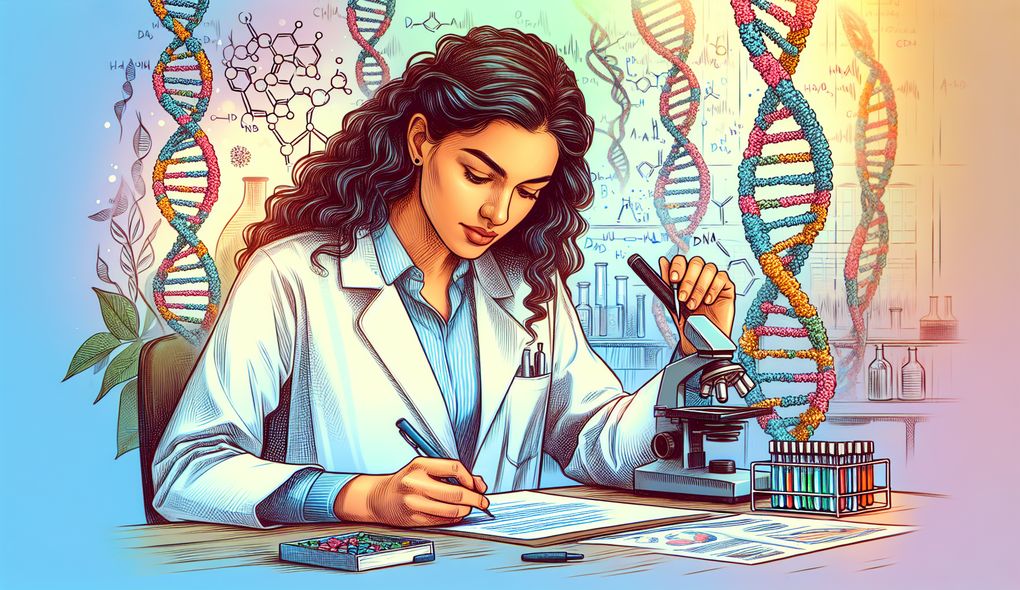How do you handle challenging or complex genetic information?
INTERMEDIATE LEVEL

Sample answer to the question:
When handling challenging or complex genetic information, I approach it with a systematic and analytical mindset. I start by carefully reviewing the information and understanding the context and the implications it may have on the patient's health. I then collaborate with other medical professionals, such as genetic counselors and specialists, to ensure a comprehensive understanding. I utilize my knowledge of current genetic testing technologies and methodologies to interpret the information accurately. Excellent communication skills are crucial in this process, as I need to effectively explain the findings to patients and their families, while also addressing any concerns or questions they may have. I stay updated with the latest advancements in clinical genetics and genomics through continuous professional development and attending conferences and seminars. Overall, my approach is centered around empathy, sensitivity, and a commitment to providing the best possible care based on the complex genetic information.
Here is a more solid answer:
When faced with challenging or complex genetic information, I follow a systematic approach to ensure accurate interpretation and provide the best care. Firstly, I thoroughly review the information, identifying any patterns or implications for the patient's health. To enhance my understanding, I collaborate with other experts like genetic counselors and specialists. Utilizing my knowledge of current genetic testing technologies and methodologies, I analyze the information in-depth. Clear and effective communication is vital in genetic counseling, so I ensure that I can explain the findings to patients and their families in a compassionate and easily understandable manner. I also address any concerns or questions they may have, providing support throughout their genetic testing journey. It's important to stay up-to-date with advancements in clinical genetics and genomics, and I achieve this through continuous professional development opportunities like attending conferences and engaging with online resources. By embodying empathy, sensitivity, and a commitment to ongoing learning, I am well-prepared to handle challenging or complex genetic information.
Why is this a more solid answer?
The solid answer provides a more comprehensive response by elaborating on each aspect mentioned in the job description. It emphasizes the candidate's systematic approach, collaboration with other experts, utilization of current genetic testing technologies, effective communication, support for patients and families, commitment to ongoing learning, empathy, and sensitivity. The answer provides a good level of detail but could be enhanced further by incorporating specific examples or experiences that demonstrate the candidate's proficiency in these areas.
An example of a exceptional answer:
Handling challenging or complex genetic information is a task I approach with rigor and expertise. I begin by meticulously analyzing the data, taking into account factors such as the patient's medical history, familial genetics, and relevant research literature. Effortlessly collaborating with a multidisciplinary team, I engage in discussions that generate deeper insights regarding diagnoses, prognoses, and treatment plans. My extensive knowledge of cutting-edge genetic technologies and methodologies allows me to navigate through complex genetic information seamlessly. Communicating complex concepts to patients and their families is an area where my exceptional communication skills truly shine. I translate technical jargon into plain language, ensuring everyone comprehends the implications of the genetic information. Moreover, I grasp the emotional toll this information may have on patients and their loved ones, and I offer unwavering support throughout the process. Continual professional growth is of great importance to me, and I actively pursue opportunities like attending conferences, workshops, and engaging in genomic research projects. My deep sense of empathy and sensitivity helps me thrive in this field, allowing me to navigate challenging situations with grace and compassion.
Why is this an exceptional answer?
The exceptional answer goes above and beyond by providing a highly detailed and comprehensive response. It highlights the candidate's meticulous approach to analyzing genetic information, their ability to collaborate effectively with a multidisciplinary team, their extensive knowledge of cutting-edge technologies, and their exceptional communication skills in translating complex concepts. The answer also emphasizes the candidate's unwavering support for patients and their families, commitment to professional growth, and their deep sense of empathy and sensitivity. The answer is well-structured and highly detailed, showcasing the candidate's proficiency in all evaluation areas.
How to prepare for this question:
- Stay updated with the latest advancements in clinical genetics and genomics by subscribing to relevant journals, attending conferences, and participating in online forums or webinars.
- Seek opportunities to collaborate with genetic counselors, specialists, and other medical professionals to enhance your understanding and problem-solving skills in handling complex genetic information.
- Practice explaining complex genetic concepts in simple and understandable language to improve your communication skills with patients and their families.
- Understand the ethical, legal, and professional standards related to genetic testing and patient privacy by familiarizing yourself with relevant guidelines, policies, and regulations.
- Reflect on your experiences in handling challenging or complex genetic information and be prepared to provide specific examples or anecdotes during the interview.
What are interviewers evaluating with this question?
- Strong analytical and problem-solving skills related to genetics and genomics
- Excellent written and verbal communication skills for patient counseling and interdisciplinary collaboration
- Knowledge of current genetic testing technologies and methodologies
- Ability to work effectively in a team and contribute to a collaborative environment
- Empathy and sensitivity when dealing with patients' health concerns and the implications of genetic testing
- Proficiency in electronic medical records and genetic databases
- Commitment to ongoing professional development in the field of clinical genetics

